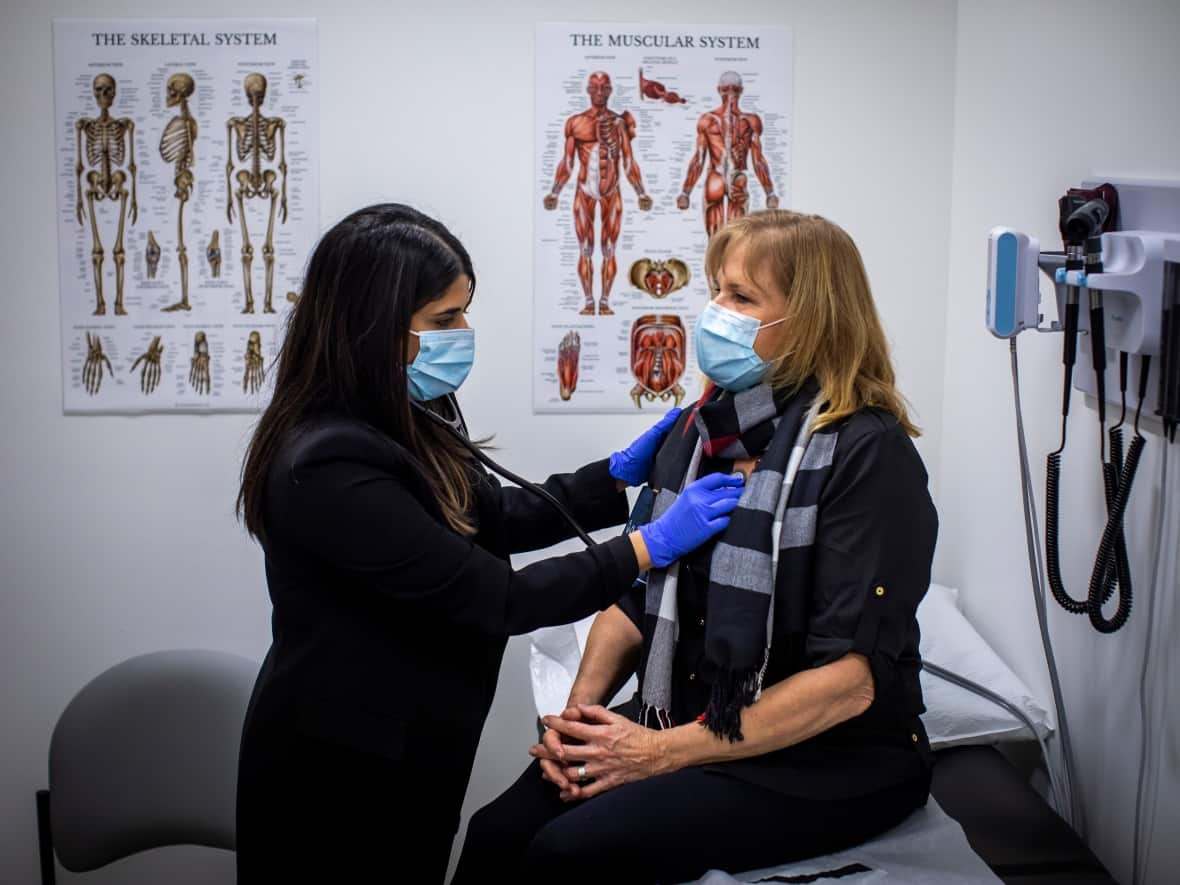Alberta's nurse practitioners seek autonomy as family doctor shortage worsens

Alberta's nurse practitioners say they could be doing more to help the province's ailing health-care system — by caring for patients who don't have a family doctor— and they're renewing calls for the provincial government to put a system in place to allow for that.
Nurse practitioners (NPs) are registered nurses with extra training and, like family physicians, they can order tests, prescribe medication, manage chronic diseases and make referrals to specialists.
But they say they can't set up publicly funded independent practices because they have no mechanism to get paid directly by the Alberta government.
"There's roughly 300 nurse practitioners that could open clinics tomorrow and service a full panel of patients, so that's anywhere from a thousand to 1,500 patients [for each nurse practitioner]. But we have no way to get paid," said Susan Prendergast, the director of independent practice with the Nurse Practitioner Association of Alberta.
"The other barrier is that the current model of NP employment requires that we are employees of a primary care network that is basically run by physicians and so again our role is determined by someone else."
The Nurse Practitioner Association of Alberta submitted a proposal last year suggesting a salary model that would see them paid directly by the province and bring in roughly 25 per cent less than the average doctor who bills through the fee-for-service model.

Other provinces further ahead
Prendergast, who's an assistant professor in the University of Victoria's school of nursing, said Alberta lags behind other provinces such as B.C., Ontario and Nova Scotia, where NPs have more autonomy.
"Our work has been going on for more than 15 years to provide Albertans with access to independent nurse practitioners. There's never been a more critical time," said Karen Parker, vice-president of the Nurse Practitioner Association of Alberta.
"You're having more provider accessibility issues, less care being provided and more gaps in care typically from fallout from the pandemic."
According to the Nurse Practitioner Association of Alberta, there are 749 NPs working in Alberta. Most of them practice in hospitals and some in primary care networks alongside physicians.
Government considering the idea
The Alberta government is not committing to the proposed changes but says it is considering them as it studies a range of different structures and funding models.
"Alberta's government continues to focus on providing greater choice to Albertans in their health-care practitioners by increasing the number and scope of NPs in Alberta," Alberta Health spokesperson Charity Wallace said in a statement emailed to CBC News.
"This work involves developing access guidelines, population health needs assessments and an exploration of opportunities to establish collaborative team-based clinics that are appropriately staffed to meet the needs of Albertans."

Health officials will continue to consult with NPs and other stakeholders, she said, adding the government intends to focus on areas where the need is greatest.
That means expanding the Primary Care Network Nurse Practitioner Support Program, announced in 2019, which set up funding for PCNs to hire nurse practitioners with a focus on under-served areas including rural and remote locations.
Fifty-six of the 86 nurse practitioners currently working in PCNs are funded through this program.
Developing a strategy to address the growing need in primary care will be a "top priority" for Health Minister Jason Copping heading into the fall, Wallace said.
Nurse practitioner argue, though, simply expanding the existing program won't go far enough.
"It's either all or nothing. There's no more time for not providing this opportunity for Albertans to access services from independent nurse practitioners," said Parker, adding the association is now meeting with MLAs in an effort to get their message out.
For its part, the Alberta Medical Association (AMA) said it sees a role for nurse practitioners in relieving some health-care pressures.
"NPs are well trained and valuable members of the health-care team and one area they can provide value in the system is with the many patients who do not have a family physician," an AMA spokesperson said in an email to CBC news.
What isn't clear, the AMA noted, is how independent clinics would be integrated with the networks already in place.
"Investment in integrated primary care pays off with better patient care, fewer ED visits and lower system costs in the long term. We would welcome discussions to see how these clinics could work with primary care networks and how physicians and NPs could collaborate for better patient care."
More options for patients
Meanwhile, some Albertans — impacted by the growing family doctor shortage grows — welcome another option in primary care providers.
Calgarian Donna Leslie and her husband have struggled to find and keep a family doctor since their long-time physician retired five years ago.
"A lot of things were falling through the cracks," she said.
They both have chronic conditions and recently ended up seeing Parker, who took them on as patients.
"She not only does the actual tests, she takes the times to go over all the results and give us options for how to treat ... that total, thorough care that you sometimes don't see elsewhere."
After years of bouncing between doctors and walk-in clinics Leslie said she and her husband feel like they're regaining control of their health and are less anxious overall.
"Doctors are leaving. Nurses are leaving... something needs to be done. And if nurse practitioners can fill in some of those gaps, then I say welcome to them. Invite more."


